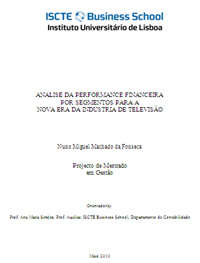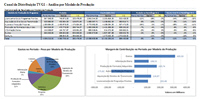 | ||||||||||||||
| ||||||||||||||
|
|
5.6 - The Management Control Role In a context of profound changes in the sector average, the manager has to understand new forms of distribution, measurement results on various platforms and different business models. The management control thus takes on greater importance and complexity over the traditional business model of the sector. In this role the manager of each unit of content must be duly accompanied by the controller, this working as its consultant and co-pilot, providing data and reports necessary for decision making. The proposed framework of management control, according to the model, will support the existence of controllers in various UNC, working directly with the managers of each. The controller of each UNC should work with the manager in formulating the strategy of unity and support the implementation of the same, each time providing the necessary information and indicators. In performing this task will be responsible for interfacing with the accounting and finance, information technology - to ensure access to information needed - administrative areas, among others. It should also provide the interface with external entities for the evaluation of business models, information exchange and other tasks relevant to the activity of UNC. Among these external entities may meet business partners, for example, operators of pay-TV platforms or mobile operators, service providers, specialized information (such as market research) or officials (ANACOM, ERC, among others ). This approach is consistent with the existence in the organization of a central management control with transversal responsibilities. Each controller UNC, although depends on your manager's hierarchy, would be responsible for liaison with the central area, by implementing policies and monitoring tools for globally agreed by the company and reporting to the central area. In a market with a dynamic so high, access to timely information is key to achieving results and decide on time. The existence of a controller at UNC will guarantee the manager access to information necessary in light of their specific business unit. In another way, access to information could be compromised by the need to solicit another area (or even several areas), depending on the availability of each one to deliver the same, with the possible need to integrate information from multiple sources and without ensuring the adequacy of that of its particular business unit. |
|
||||||||||||
nunofonseca.com - All rights reserved.


